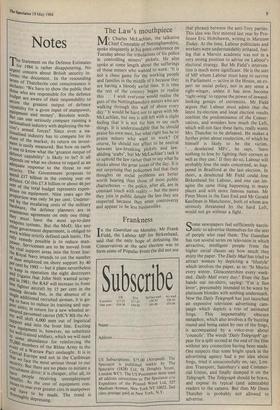Frankness
In the Guardian on Monday, Mr Frank Field, the Labour MP for Birkenhead, said that the only hope of defeating the Conservatives at the next election was to form some of Popular Front (he did not use that phrase) between the anti-Tory parties. This idea was first mooted last year by Pro- fessor Eric Hobsbawm, writing in Marxism Today. At the time, Labour politicians and workers were understandably irritated, feel- ing that a Marxist academic was not in a very strong position to advise on Labour's electoral strategy. But Mr Field's interven- tion is much more significant. He is the sort of NIP whom Labour must keep to survive in Parliament — active in the House, an ex- pert on social policy, not in any sense a right-winger, unless it has now become `right-wing' to oppose the power of inward- looking groups of extremists. Mr Field argues that Labour must admit that the latest by-election and local election results confirm the predominance of the Conser- vatives, and wonders how much the Left, which will not face these facts, really wants Mrs Thatcher to be defeated. He makes a further point about reselection, of which he himself is likely to be the victim. ... deselected MPs', he says, 'have nothing to lose by fighting their corners as well as they can.' If they do so, Labour will probably lose the seats concerned, as hap- pened in Bradford at the last election. In short, a deselected Mr Field could lose Birkenhead for Labour, and one can im- agine the same thing happening in many places and with more famous names. Mr Peter Shore in the East End and Mr Gerald Kaufman in Manchester, both of whom are seriously threatened by the hard Left, would not go without a fight.
Some newspapers feel sufficiently narcis- sistic to advertise themselves for the sort of people who read them. The Guardian has run several series on television in which attractive, intelligent people from the higher social classes say how much they enjoy the paper. The Daily Mail has tried to attract women by depicting a 'lifestyle' which involves the paper, as in: `St Moritz every winter. Gloucestershire every week- end. Daily Mail every day.' Even the Sun hands out tee-shirts, saying: 'I'm a Sun lover', presumably intended to be worn by platinum blondes with nothing underneath. Now the Daily Telegraph has just launched an expensive television advertising cam- paign which depicts a trio of animated frogs. This impenetrably obscure metaphor, which also involves a fly buzzing round and being eaten by one of the frogs, is accompanied by a voice-over about `councils'. The words 'Daily Telegraph' ap- pear for a split second at the end of the film without any connection having been made. One suspects that some bright spark in the advertising agency had a pet idea about frogs, tried it unsuccessfully on, say, Lon- don Transport, Sainsbury's and Commer- cial Union, and finally dumped it on the Telegraph. The Telegraph should be brave, and expose its typical (and admirable) readers to the camera. But then Mr Denis Thatcher is probably not allowed to advertise.














































 Previous page
Previous page